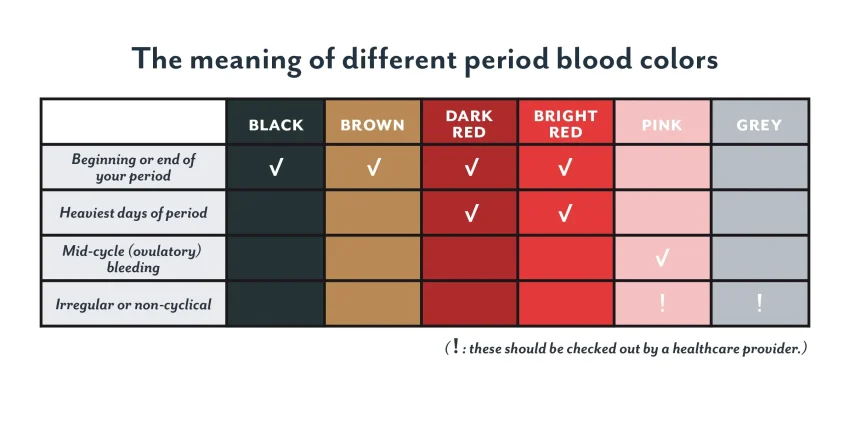Dark brown period blood is a common occurrence that many menstruators encounter during their menstrual cycles. While it might raise eyebrows, this variation in color can be completely normal and often warrants a second look. Understanding the reasons behind dark brown blood periods can provide important insights into period health and any potential menstrual cycle abnormalities you may be experiencing. Factors such as blood oxidation and the timing of your flow can influence the shade of your period blood, leading to brown discharge at the start or end of your period. Let’s explore the significance of this color change in period blood and when it might be time to consult your healthcare provider.
When discussing menstrual health, terms like “dark brown menstrual fluid” or “brown discharge during menstruation” frequently come up in conversations about periods. Color changes in period blood can signal different aspects of reproductive health and indicate various stages of the menstrual cycle. Lighter shades at the beginning of your flow may shift to darker hues later on, often revealing insights about blood age and oxygen exposure. These observations can prompt important discussions about period health and spot any irregularities that might require medical attention. Understanding these terms helps in demystifying the complexities of menstrual cycles.
Understanding Dark Brown Period Blood
Dark brown period blood can often be a source of concern for many individuals, particularly if it appears unexpectedly during their menstrual cycle. It’s crucial to understand that this color change typically indicates older blood that has had time to oxidize. As blood is expelled from the uterine lining, it can take longer to exit the body, particularly at the end or beginning of a period, resulting in a darker hue. This phenomenon isn’t unfamiliar for those tracking their menstrual cycles, as many report seeing brown discharge mixed in with their regular flow.
Furthermore, transitional phases in your menstrual cycle, such as the start or end of your period, may lead to varying shades of period blood, including dark brown. It’s essential to note that dark brown blood is generally considered normal, especially if it occurs consistently at these times. However, if this color manifests at unexpected points in the cycle, it may indicate underlying issues that warrant a discussion with a healthcare provider.
Frequently Asked Questions
What does dark brown period blood mean during my menstrual cycle?
Dark brown period blood indicates older blood that has become oxidized after being outside the uterus. This is common at the beginning or end of your period when the flow is lighter, allowing the blood to oxidize and change color.
Is brown discharge a cause for concern during my period?
Brown discharge during your period is typically not a cause for concern, especially if it occurs at the beginning or end of your cycle. However, it may warrant a discussion with your doctor if accompanied by other symptoms or if it occurs mid-cycle.
Can dark brown blood periods indicate a health problem?
While dark brown periods are usually normal, if you experience consistent brown spotting between periods, it could suggest hormonal imbalances or conditions such as endometriosis or fibroids. It’s best to consult your healthcare provider for an evaluation.
What causes period blood color change from red to dark brown?
The color change from red to dark brown in your period blood is due to oxidation. Blood that has been in the uterus longer or is older turns brown as it reacts with oxygen when exposed to air.
Should I worry if I have dark brown blood on the first day of my period?
Dark brown blood on the first day of your period is often just older blood being expelled as your period begins. If it becomes a pattern or is accompanied by unusual symptoms, consider talking to your doctor about your period health.
What are the common causes of brown discharge outside of my period?
Brown discharge outside your menstrual cycle can be caused by several factors including hormonal fluctuations, early pregnancy, perimenopause, or infections. If the discharge is persistent or concerning, seek medical advice.
How does hormonal birth control affect period blood color?
Hormonal birth control can lead to changes in menstrual cycle patterns, often resulting in dark brown spotting or periods. This is typically your body adjusting to the new hormones and is usually not a concern.
| Key Point | Explanation |
|---|---|
| Dark Brown Period Blood is Common | It is not unusual to see dark brown blood at certain times during your menstrual cycle. |
| Oxidation Process | As blood ages outside the blood vessels, it turns brown due to oxidation. |
| When to Worry | Regular brown blood at the beginning or end of periods is typically normal; mid-cycle brown spotting may require medical advice. |
| Color Change During Period | Period blood can range from pink to bright red to brown due to varying flow and amount of oxidation. |
| Possible Medical Reasons | Brown blood could signal pregnancy, perimenopause, or conditions like endometriosis or STIs. |
| Consult Your Doctor | Speak to a healthcare provider if experiencing unusual symptoms or changes in menstrual patterns. |
Summary
Dark brown period blood is often a common occurrence during menstrual cycles, primarily associated with the oxidation of older blood. While this discoloration can be entirely normal, it’s crucial to pay attention to the overall context of your menstrual health. Regular occurrences of dark brown blood, especially at the beginning and end of your period, usually don’t indicate a problem; however, if you experience unexpected brown spotting at other times, it may be a sign to consult your healthcare provider. Understanding the reasons behind dark brown period blood helps in recognizing when it’s advisable to seek medical advice.








